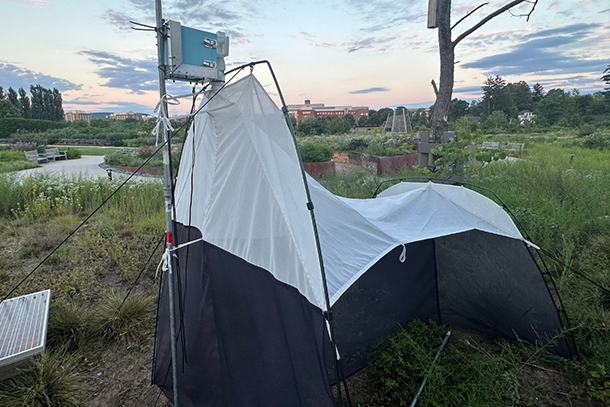
InsectEye is a camera-based, non-lethal monitoring system for flying insects developed by Penn State researchers. Insects fly into the netting, and then move through a camera chamber, before flying away. This prototype was tested in the Pollinator and Bird Garden at the Arboretum at Penn State. Credit: Penn State
Penn State receives $3M grant to address insect biodiversity crisis
August 28, 2023
By Katie Bohn
Editor’s note: This article originally appeared on Penn State News.
UNIVERSITY PARK, Pa. — A team of Penn State researchers has received a $3 million grant from the National Science Foundation to spearhead a new initiative to create novel monitoring systems for insect populations, many of which are experiencing dramatic changes across the globe due to changes in land use, pollution and climate change.
The project — called Interdisciplinary Studies in Entomology, Computer Science and Technology NETwork, or INSECT NET — will establish a graduate training program to empower students to develop solutions to the insect biodiversity crisis.
The program includes faculty from Penn State’s College of Agricultural Sciences, College of Engineering, College of Earth and Mineral Sciences, Huck Institutes of the Life Sciences, and Institute for Sustainable Agricultural, Food and Environmental Science.
Christina Grozinger, Publius Vergilius Maro Professor of Entomology and principal investigator on the project, said these solutions may include cyber-physical systems, such as small robots with camera or acoustic sensors, which can autonomously monitor, map and predict changes in insect abundance and distributions across landscapes and over time.
“With recent advances in computer science and engineering — including artificial intelligence — we now have the ability to design powerful tools for monitoring and tracking insects in our cities, farms and forests,” Grozinger said. “Having such detailed, real-time information on insects in these different landscapes can help us better manage and conserve these important creatures.”
Rick Roush, dean of the College of Agricultural Sciences, said the project is an exciting opportunity for new collaboration.
“This is a bold new initiative, led by faculty who are internationally recognized across a wide range of expertise to develop the latest in advanced technologies for critical investigations in ecosystems around the world, while training our students in skills that can be used in multiple disciplines and industries,” Roush said.
According to Grozinger, insects are essential for human and ecosystem health. Some insects are pests that need to be managed, such as mosquitos, while others are beneficial and need to be conserved, such as bees. However, populations of some pest species are expanding while populations of beneficial species are declining.
“New technologies — such as autonomous, eco-sensitive robots with intelligent sensors that can navigate, observe and interact with fragile ecosystems — could help provide key insight into changes in insect biodiversity,” said Vijay Narayanan, A. Robert Noll Chair Professor of Computer Science & Engineering and Electrical Engineering and a co-principal investigator on the project. He is also the associate dean for innovation in the College of Engineering. “This data could then be used by communities and policymakers to make key decisions to help mitigate pests while conserving beneficial species.”
Anthony Robinson, associate professor of geography and director of the GeoGraphics Lab and a co-principal investigator on the project, said that while the ultimate goal is to develop these sophisticated tools, the near-term goal is to train the next generation of scientists to think creatively and collaboratively to address complex real-world problems.
“Students in this program will collaborate with stakeholders like farmers, land managers, and urban planners to learn about the specific challenges they face,” Robinson said. “They will work in interdisciplinary teams to design monitoring systems for these partners, and to learn together about their insect populations.”
Trainees in the program will have the opportunity to gain competencies in insect systematics, ecology, sensor design, energy efficient optimizations, continual learning and adaptation of AI systems, robotic systems, data integration, and data management, including designing visualization tools accessible to stakeholders.
They may also gain skills in communicating science to the public and K–12 schools, project management and best practices for convergence research, as well as additional opportunities for professional development and networking.
The research team said developing these tools and training programs requires research and collaboration across disciplines, including the life sciences, computer science, engineering and data science, as well as leveraging the latest advances in artificial intelligence.
“This project draws on one of Penn State’s true strengths, interdisciplinary collaborative research, and engages our students in that enterprise as they seek solutions to a problem of planetary proportions,” said Lee Kump, John Leone Dean in the College of Earth and Mineral Sciences.
The grant is part of the NSF Research Traineeship Program, which according to the NSF “advances research by training graduate students in interdisciplinary or convergent research areas through a comprehensive traineeship model that is innovative, evidence-based and aligned with evolving workforce and research needs. The program is transforming STEM graduate education across the nation.”
“Preserving biodiversity on a global scale requires an effort beyond the confines of any one discipline,” said Tonya L. Peeples, interim Harold and Inge Marcus Dean in the College of Engineering. “Students will learn firsthand that unconventional solutions often emerge at the crossroads of expertise in convergent research.”
The project is funded by the NSF Division of Graduate Education.
Additional co-principal investigators on the project include Jared Ali, Dorothy Foehr Huck and J. Lloyd Huck Endowed Chair of Chemical Ecology and director of the Center for Chemical Ecology; Natalie Boyle, assistant research professor in Entomology and director for educational programming at the Insect Biodiversity Center; Bo Cheng, Kenneth K. and Olivia J. Kuo Early Career Professor of Mechanical Engineering; Huanyu “Larry” Cheng, James L. Henderson, Jr. Memorial Associate Professor of Engineering Science and Mechanics; Mehrdad Mahdavi, Dorothy Quiggle Career Development Assistant Professor of Computer Science and Engineering, Harland Patch, assistant research professor in entomology and director of Pollinator Programming at the Arboretum at Penn State; and Stevie Rocco, director of Learning Design at the John A. Dutton e-Education Institute.



